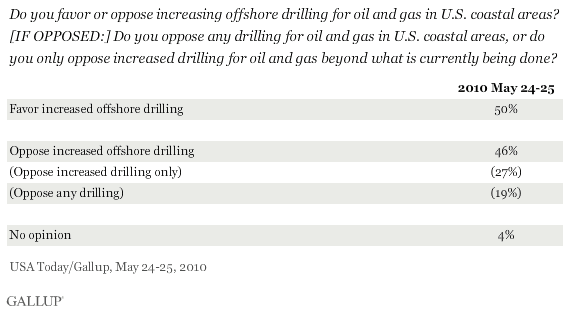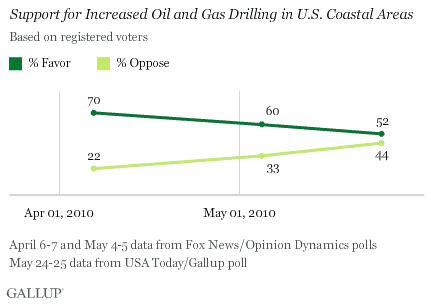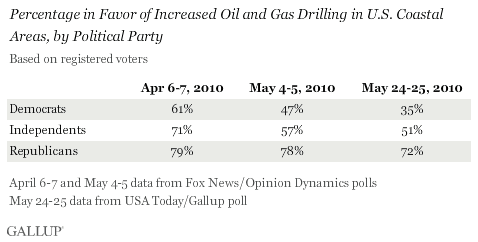PRINCETON, NJ -- President Barack Obama's decision to extend a moratorium on new deepwater ocean drilling comes at a time when Americans are divided, with 50% in favor and 46% opposed, on increased drilling for oil and gas off U.S. coasts. However, most stop short of favoring a prohibition on drilling, as, on a follow-up question, 19% of Americans say they are opposed to all drilling in U.S. coastal areas.

The poll indicates that public support for increased oil drilling has eroded as the oil spill crisis has dragged on.
A Fox News/Opinion Dynamics poll conducted in early April -- before the spill occurred -- asked the same question of registered voters and found 70% favoring increased drilling in U.S. coastal areas. That number dipped to 60% in early May, shortly after the oil spill occurred. In the new USA Today/Gallup poll, 52% of registered voters support drilling, suggesting support has slipped further as the oil spill has expanded in size and begun to come ashore.

Since April, Democratic voters' support for increased coastal oil drilling has fallen well below the majority level. Independent voters' support has also declined significantly, but remains just above a majority in the latest poll. Meanwhile, there has been just a slight decline in the percentage of Republican voters who are in favor of increased drilling.

Bottom Line
Americans' support for increased offshore drilling has declined significantly since April, to the point that the public is now about evenly divided on the issue. President Obama's decision to extend the moratorium on new offshore drilling is now more in line with Americans' -- and particularly Democrats' -- current views on drilling after the oil spill than before it, when Obama called for more drilling. The oil spill has also changed Americans' attitudes on the trade-off between energy production and environmental protection -- underscoring the challenges U.S. leaders will face in addressing such issues going forward.
Survey Methods
Results are based on telephone interviews conducted May 24-25, 2010, with a random sample of 1,049 adults, aged 18 and older, living in the continental U.S., selected using a random-digit-dial sampling technique.
For results based on the total sample of national adults, one can say with 95% confidence that the maximum margin of error is ±4 percentage points.
For results based on the sample of 946 registered voters, the maximum margin of sampling error is ±4 percentage points.
Interviews are conducted with respondents on landline telephones (for respondents with a landline telephone) and cellular phones (for respondents who are cell phone only). Each sample includes a minimum quota of 150 cell phone only respondents and 850 landline respondents, with additional minimum quotas among landline respondents for gender within region. Landline respondents are chosen at random within each household on the basis of which member had the most recent birthday.
Samples are weighted on the basis of gender, age, race, education, region and phone lines. Demographic weighting targets are based on the March 2009 Current Population Survey figures for the aged 18 and older non-institutionalized population living in continental U.S. telephone households. All reported margins of sampling error include the computed design effects for weighting and sample design.
Interviews are conducted with respondents on landline telephones (for respondents with a landline telephone) and cellular phones (for respondents who are cell phone only).
In addition to sampling error, question wording and practical difficulties in conducting surveys can introduce error or bias into the findings of public opinion polls.
